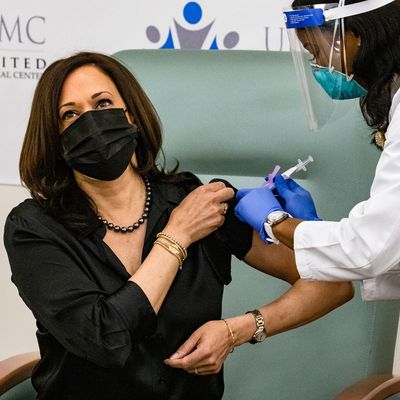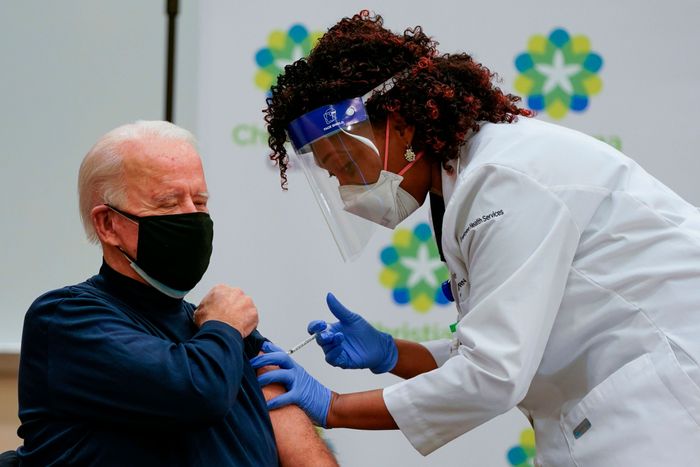
Many high-ranking U.S. government officials have taken their first dose of the COVID-19 vaccine, placing them among the first people in the country to receive the shot. On Monday, December 21, President-elect Joe Biden received his first injection in a televised appearance, and Vice President-elect Kamala Harris followed on Tuesday, December 29. Many other politicians have shared similar footage of themselves getting injected to boost public confidence, though some lawmakers have drawn scrutiny after doing so — particularly those perceived as jumping the vaccine line after months of playing down the pandemic. Here’s how the vaccine rollout is going on the Hill.
Who’s been vaccinated so far?
Joe Biden
The president-elect received his first dose of the Pfizer and BioNTech vaccine at Christiana Hospital in Newark, Delaware on Monday, December 21. “I’m doing this to demonstrate that people should be prepared, when it’s available, to take the vaccine,” Biden said during the televised event. “There’s nothing to worry about. I’m looking forward to the second shot.” Earlier in the day, Dr. Jill Biden, Biden’s wife and the incoming first lady, received her injection. Biden thanked front-line health-care workers and those involved in the development and rollout of the vaccine. “We owe these folks an awful lot,” he said, lauding Operation Warp Speed, the federal government’s vaccine program, for “getting this off the ground.”
Kamala Harris
The vice-president elect received the first dose of the Moderna vaccine on Tuesday, December 29 at United Medical Center in Washington, D.C. Her husband, Doug Emhoff, was vaccinated off-camera.
“It’s literally about saving lives. I trust the scientists and it is the scientists who created and approved this vaccine,” Harris said after receiving the shot. “So I urge everyone, when it is your turn, get vaccinated. It’s about saving your life, the life of your family members and the life of your community.”
Mike Pence
The vice-president became the senior-most U.S. official to receive the vaccine when he got his first shot on December 18 in a live-television event. “I didn’t feel a thing. Well done,” Pence told Walter Reed National Military Medical Center technicians. Pence’s wife, Karen, also received the vaccine at the event, as did Surgeon General Jerome Adams.
The leaders of the House and Senate
Speaker of the House Nancy Pelosi and Senate Majority Leader Mitch McConnell also received the vaccine on December 18, sharing photos of themselves getting inoculated hours after Pence received his first dose.
Chuck Schumer, AOC, and other New York lawmakers
Senate Minority Leader Schumer announced on December 19 that he had received his first shot, as did Representative Alexandria Ocasio-Cortez, who recorded the experience on social media. A number of other New York lawmakers also said they had received their first dose of the Pfizer vaccine.
Bernie Sanders
The Vermont senator received his first dose on December 19 and shared a photo of himself getting inoculated by Capitol physician Brian Monahan. In a statement, Sanders, 79, called on Americans to remain vigilant: “As the vaccine is being distributed, we must all continue wearing masks and engage in social distancing. That is how we will beat this virus and end this terrible pandemic.”
Jim Clyburn
The House Majority Whip received the vaccine on December 18 and encouraged others to follow his lead once it is readily available.
Elizabeth Warren
The Massachusetts senator said she received her first dose on Saturday, December 19 calling the vaccine “a testament to all we can achieve when we listen to scientists, follow the advice of public health experts, and come together as a country.” Senator Ed Markey, Warren’s Democrat counterpart — and fellow septuagenarian — was also inoculated.
Mitt Romney
The Utah senator shared a photo of himself getting the vaccine on December 18.
Dr. Anthony Fauci
Fauci, director of the National Institute of Allergy and Infectious Diseases and the nation’s best-known infectious disease expert, received the first dose of the Moderna vaccine during a televised event on Tuesday, December 22 along with his boss, NIH Director Francis Collins, Health and Human Services Secretary Alex Azar, and frontline NIH health care workers who have been treating COVID patients.
Controversial GOP officials
Marco Rubio
The Florida senator was criticized after posting a photo of himself getting the COVID-19 vaccine, given, as many were quick to point out, his handling of the pandemic. In addition to flouting public-health guidance — Rubio spoke at massive, mask-free rallies for President Donald Trump’s re-election campaign earlier this year — the 49-year-old senator has also complained that the news media’s pandemic coverage “emphasized bad news even when we had positive developments,” which he tied to “a broader pattern of characterizing everything as bad news Republicans are to be blamed for.”
Lindsey Graham
The South Carolina senator and Senate Judiciary Committee chairman drew similar scrutiny after announcing he had received his first dose of the vaccine. In October, the GOP senator refused to take a COVID-19 test prior to a debate against his primary opponent, even though Graham had recently met with other officials who tested positive, lawyer David Uhlfelder noted.
Joni Ernst
Just months after accusing medical workers of falsifying the number of COVID-19 cases to make money, the senator from Iowa shared a photo of herself receiving the coronavirus vaccine on December 20, encouraging “all Iowans and Americans to do the same when their time comes” and declaring the country “one step closer to defeating this virus.” In September, Ernst said at a campaign stop that she was “so skeptical” of the official numbers of cases and deaths, echoing a widely debunked conspiracy theory in telling the crowd: “These health care providers and others are reimbursed at a higher rate if COVID is tied to it, so what do you think they’re doing?”
Why are U.S. officials getting vaccinated first?
While front-line medical workers and long-term care residents are generally receiving priority in the first round of vaccine distribution, a limited number of doses have been reserved for members of Congress in order “to meet long-standing requirements for continuity of government operations,” Brian Monahan, the Capitol physician, told lawmakers in a letter. Monahan said members of Congress will be first in line in the Hill’s vaccine rollout, followed by “continuity-essential staff members,” according to Politico. “The appointing process will then continue until the small vaccine supply is exhausted,” Monahan wrote in his memo, noting spouses and family members will not be able to dip into the congressional supply.
Why is Trump holding off?
The president’s personal bout with COVID-19 technically places him at the back of the vaccine queue, and he suggested as much earlier in December, tweeting that he was “not scheduled” to receive the shot but looked “forward to doing so at the appropriate time.” When that will be, however, remains to be seen: The CDC’s Advisory Committee on Immunization Practices said that individuals who received the kind of treatment Trump did should wait “at least 90 days, as a precautionary measure until additional information becomes available, to avoid interference of the antibody treatment with vaccine-induced immune responses,” the Associated Press reports.
Surgeon General Jerome Adams cited the CDC commitee’s advice when asked about Trump’s inoculation plans during an appearance on CBS Sunday, while, as the AP notes, White House press secretary Kayleigh McEnany offered other reasoning behind the delay, saying Trump is waiting, in part, “to show Americans that our priority [is] the most vulnerable.” The president, who for months has botched the federal government’s pandemic messaging and spread misinformation about the coronavirus, including about risks posed by the vaccine, “wants to send a parallel message” demonstrating “our long-term care facility residents and our frontline workers are paramount in importance,” according to McEnany. “He wants to set an example in that regard,” she said.
Dr. Anthony Fauci said the president should receive a shot immediately. “Even though the president himself was infected, and he has, likely, antibodies that likely would be protective, we’re not sure how long that protection lasts. So, to be doubly sure, I would recommend that he get vaccinated,” he told ABC News.
Who’s next?
On December 28, Congress’s attending physician, Brian Monahan, said two staffers in every House member and senator’s personal offices are now eligible to receive the vaccine, per Politico. The number of eligible staffers will be bumped up to four for every committee chair and ranking committee member.
Monahan said in his memo that this wave of vaccines is meant for staffers whose jobs are essential for “continuity of operations,” or whose duties are likely to require in-person interaction.
In early December, former presidents Barack Obama, George W. Bush, and Bill Clinton said they would publicly take the vaccine once they are eligible to boost public confidence.































